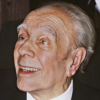Jorge Luis Borges

Jorge Luis Borges
Jorge Francisco Isidoro Luis Borges KBE; 24 August 1899 – 14 June 1986), was an Argentine short-story writer, essayist, poet and translator, and a key figure in Spanish-language literature. His best-known books, Ficcionesand El Aleph, published in the 1940s, are compilations of short stories interconnected by common themes, including dreams, labyrinths, libraries, mirrors, fictional writers, philosophy, and religion...
NationalityArgentinian
ProfessionPoet
Date of Birth24 August 1899
dream book writing
I know of a wild region whose librarians repudiate the vain superstitious custom of seeking any sense in books and compare it to looking for meaning in dreams or in the chaotic lines of one's hands . . . They admit that the inventors of writing imitated the twenty-five natural symbols, but they maintain that this application is accidental and that books in themselves mean nothing. This opinion - we shall see - is not altogether false.
running father book
My father gave me free run of his library. When I think of my boyhood, I think in terms of the books I read.
book boys letters
As a boy, I used to marvel that the letters in a closed book did not get scrambled and lost overnight.
dream book hands
I know of one semibarbarous zone whose librarians repudiate the "vain and superstitious habit" of trying to find sense in books, equating such a quest with attempting to find meaning in dreams or in the chaotic lines on the palms of one's hand.
book might kind
The European and the North American consider that a book that has been awarded any kind of prize must be good; the Argentine allows for the possibility that the book might not be bad, despite the prize.
art memories book
The gods weave misfortunes for men, so that the generations to come will have something to sing about.” Mallarmé repeats, less beautifully, what Homer said; “tout aboutit en un livre,” everything ends up in a book. The Greeks speak of generations that will sing; Mallarmé speaks of an object, of a thing among things, a book. But the idea is the same; the idea that we are made for art, we are made for memory, we are made for poetry, or perhaps we are made for oblivion. But something remains, and that something is history or poetry, which are not essentially different.
book past thinking
I can’t talk about my books. I have written them and tried to forget them. I have written once, and readers have read me many times, no? I try to think of what I wrote, it’s very unhealthy to think about the past, the case of elegies is very sad, as much as the case of complaints.
book night tears
Let neither tear nor reproach besmirch this declaration of the mastery of God who, with magnificent irony, granted me both the gift of books and the night.
memories book axes
A book is more than a verbal structure or series of verbal structures; it is the dialogue it establishes with its reader and the intonation it imposes upon his voice and the changing and durable images it leaves in his memory. A book is not an isolated being: it is a relationship, an axis of innumerable relationships.
book order serenity
Leaving behind the babble of the plaza, I enter the Library. I feel, almost physically, the gravitation of the books, the enveloping serenity of order, time magically dessicated and preserved.
art latin book
It is worth remembering that every writer begins with a naively physical notion of what art is. A book for him or her is not an expression or a series of expressions, but literally a volume, a prism with six rectangular sides made of thin sheets of papers which should include a cover, an inside cover, an epigraph in italics, a preface, nine or ten parts with some verses at the beginning, a table of contents, an ex libris with an hourglass and a Latin phrase, a brief list of errata, some blank pages, a colophon and a publication notice: objects that are known to constitute the art of writing.
book library paradise
I had always thought of Paradise / In form and image as a library.
book
I have always come to life after coming to books.
book ambition exercise
The exercise of letters is sometimes linked to the ambition to contruct an absolute book, a book of books that includes the otherslike a Platonic archetype, an object whose virtues are not diminished by the passage of time.